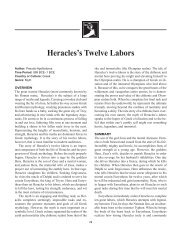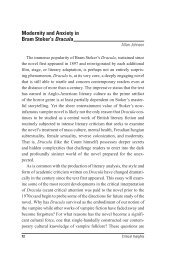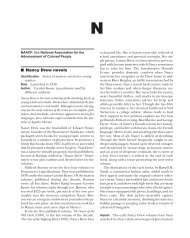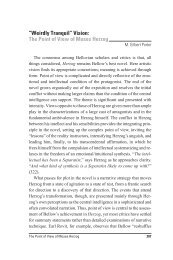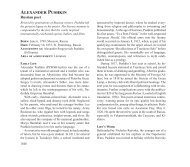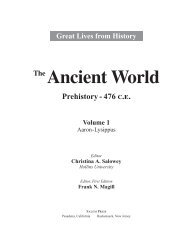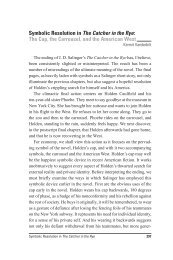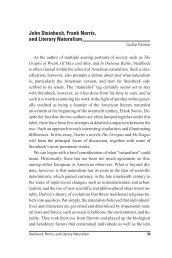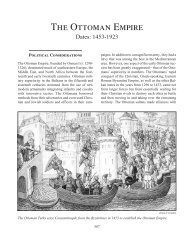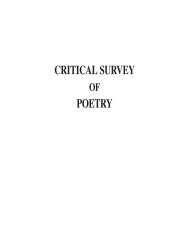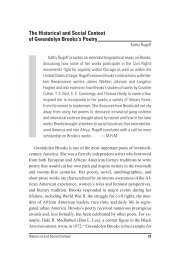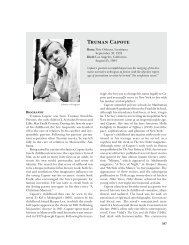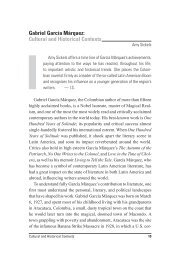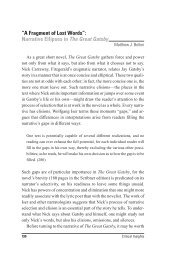Introduction to Poe Criticism Overview: Poe and the ... - Salem Press
Introduction to Poe Criticism Overview: Poe and the ... - Salem Press
Introduction to Poe Criticism Overview: Poe and the ... - Salem Press
Create successful ePaper yourself
Turn your PDF publications into a flip-book with our unique Google optimized e-Paper software.
explicitly claimed that <strong>Poe</strong> himself was like <strong>the</strong> characters he created.<br />
Describing <strong>Poe</strong> as one of literature’s “most brilliant <strong>and</strong> erratic stars,”<br />
Griswold largely created <strong>the</strong> idea of <strong>Poe</strong> as an artistic genius <strong>to</strong>rmented<br />
<strong>to</strong> madness. Griswold exp<strong>and</strong>ed his profile in an introduction he wrote<br />
<strong>to</strong> what was for a time <strong>the</strong> definitive edition of <strong>Poe</strong>’s works. Griswold’s<br />
viewpoint was disputed by o<strong>the</strong>rs who knew <strong>Poe</strong> but was widely repeated<br />
<strong>and</strong> became popularly accepted.<br />
Reception in Europe<br />
The picture of <strong>Poe</strong> as <strong>the</strong> Romantic artist was enshrined by Charles<br />
Baudelaire, one of <strong>the</strong> greatest French poets of <strong>the</strong> nineteenth century.<br />
Baudelaire discovered <strong>Poe</strong>’s writings in 1852, three years after <strong>Poe</strong>’s<br />
death, <strong>and</strong> began translating his works <strong>and</strong> writing articles about him.<br />
In His<strong>to</strong>ires extraordinaires (1856) Baudelaire characterized <strong>Poe</strong> as<br />
<strong>the</strong> poète maudit (“accursed poet”), who suffered in <strong>the</strong> materialistic<br />
<strong>and</strong> commercial society of America yet was able <strong>to</strong> create <strong>the</strong> finest literature<br />
of his age. Baudelaire himself died broke <strong>and</strong> unrecognized,<br />
but he profoundly influenced <strong>the</strong> next generation of French poets,<br />
who enthusiastically seconded his appreciation of <strong>Poe</strong>. The French<br />
Symbolist movement, led by Stéphane Mallarmé, believed that <strong>the</strong> role<br />
of art was <strong>to</strong> give expression <strong>to</strong> <strong>the</strong> wild confusion of <strong>the</strong> poetic mind,<br />
reveling in symbolic language <strong>and</strong> literary artifice. <strong>Poe</strong> was <strong>the</strong>ir avatar.<br />
Admiration for <strong>Poe</strong> was expressed by o<strong>the</strong>r prominent European literary<br />
figures as well. In an 1861 introduction <strong>to</strong> three of <strong>Poe</strong>’s tales<br />
newly translated in<strong>to</strong> Russian, Dos<strong>to</strong>evsky declared that <strong>the</strong> “vigor of<br />
[<strong>Poe</strong>’s] imagination” distinguished him from every o<strong>the</strong>r author (61).<br />
In Engl<strong>and</strong>, Algernon Charles Swinburne, Oscar Wilde, <strong>and</strong> Dante Gabriel<br />
Rossetti lauded <strong>Poe</strong>. These writers, from Baudelaire on, are often<br />
considered <strong>to</strong> be <strong>the</strong> first modernists, <strong>and</strong> <strong>the</strong>ir praise recast <strong>Poe</strong> (whom<br />
<strong>the</strong> edi<strong>to</strong>r of The Sou<strong>the</strong>rn Literary Messenger had dismissed as retrograde)<br />
as a forefa<strong>the</strong>r of modernist writing.<br />
<strong>Introduction</strong> <strong>to</strong> <strong>Poe</strong> <strong>Criticism</strong> 39



